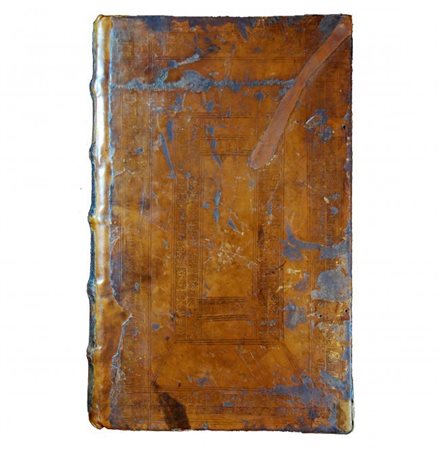 Bibliopathos - Via Enrico Toti 1, 37129 Verona
Bibliopathos - Via Enrico Toti 1, 37129 Verona
Medieval Notary Manuscripts & Law Books Sessione Unica - dal lotto 1 al lotto 280
Monday 28 December 2015 hours 17:00 (UTC +01:00)
ONE OF THE MOST ANCIENT TREATISES ON COMMERCIAL PRACTICEALSO INVOLVING ETHICS...
ONE OF THE MOST ANCIENT TREATISES ON COMMERCIAL PRACTICE
ALSO INVOLVING ETHICS APPLIED TO ECONOMY
De Leys, Leonard (Lessio, Leonardo). De iustitia et iure ceterisque virtutibus cardinalibus libri quatuor, ad 2.2. D. Thomae a quaest. 47. usque ad q. 171. Auctore Leonardo Lessio e Societate Iesu […]. Editio quinta, auctior et castigatior cum appendice de Monte Pietatis. Antuerpiae (Antwerp): ex officina Plantiniana, apud Balthasarem Moretum et Viduam Jo. Moreti et Jo. Mursium, 1621.
Folio (36 x 23 cm); full brown leather on wooden boards, with five raised bands spine, gilted title on a light brown label at spine, gilted decorations at spine and decorated blind tooling at boards, corner bosses (traces of missing clasps at the board-edges, traces of use, leather repairs); pp. XVI, 825, LXIX. Text in Latin, printed in two columns.
Engraved title-page signed: Pet. Paul. Rubenius inuent. [Rubens] and Cor. Galleus sculpsit. [Corneille Galle]. Printer's device on verso of last leaf.
Initials; tailpieces; printed marginal notes.
Nice full-page engraving, pasted at the front inside-cover, not referred to the work, representing Alessandro Magno (Alexander Magnus Aristoteli Magistro Malin scientia rerum optimarum excellere quam opulentia. A. Gellius).
One of the many editions (probably the tenth) of this theological work (first published in Leuwen in 1605), also containing a juridical value, being one of the most ancient treatise on ethics applied to economy: Lessius's considerations on the morality of economic operations had an enormous influence on thought and behaviour of many political and ecclesiastical authorities.
The work is preceded by the dedicace to Albert VII, Archduke of Austria, made in Louwein on 28 Aug., 1605), the preface and the explanations; the text is divided in four books, one for every cardinal virtue: De prudentia (Prudence), De iustitia et iure (Justice), De fortitudine (Fortitude) and De temperantia (Temperance). Then, the text is followed by the Appendix (Appendix ad dubitationem XXIII. cap. XX. lib. II. de monte pietatis occasio scriptionis, p. 809-825), the Approbatio and the Index.
The author, Leonard de Leys (Leonardo Lessio, 1554-1623), was a Flemish moral theologian from the Jesuit order, teacher of philosophy and theology at Douay and Leuwen, best known for his treatise De iustitia et iure ("On Justice and Law"), of 1605 that had more than 20 editions in the 17th century. It is probably the first in-depth moral theological approach to economic and financial questions.
Lessius challenged in an authoritative way the traditional economic doctrines, and was consulted by the merchants of Antwerp as well as church leaders, statesmen. His work contains interesting details about the various forms of superstition, devil cult, sorcery and magic. Even ritual blasphemies were practiced, carnal love acts were performed on holy places.








